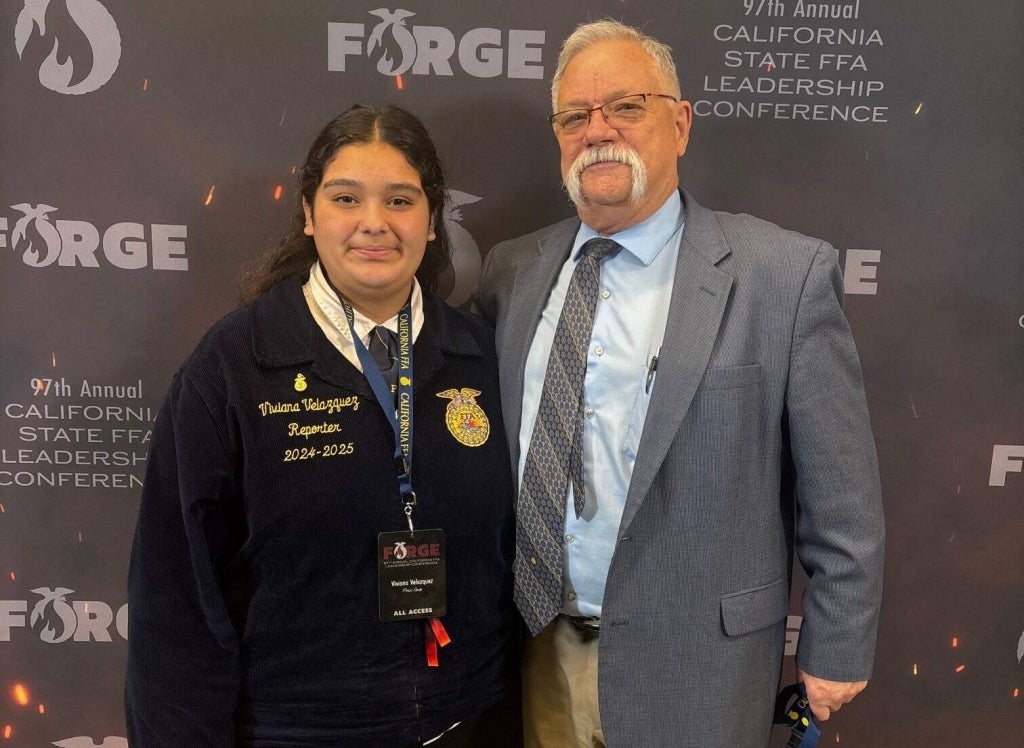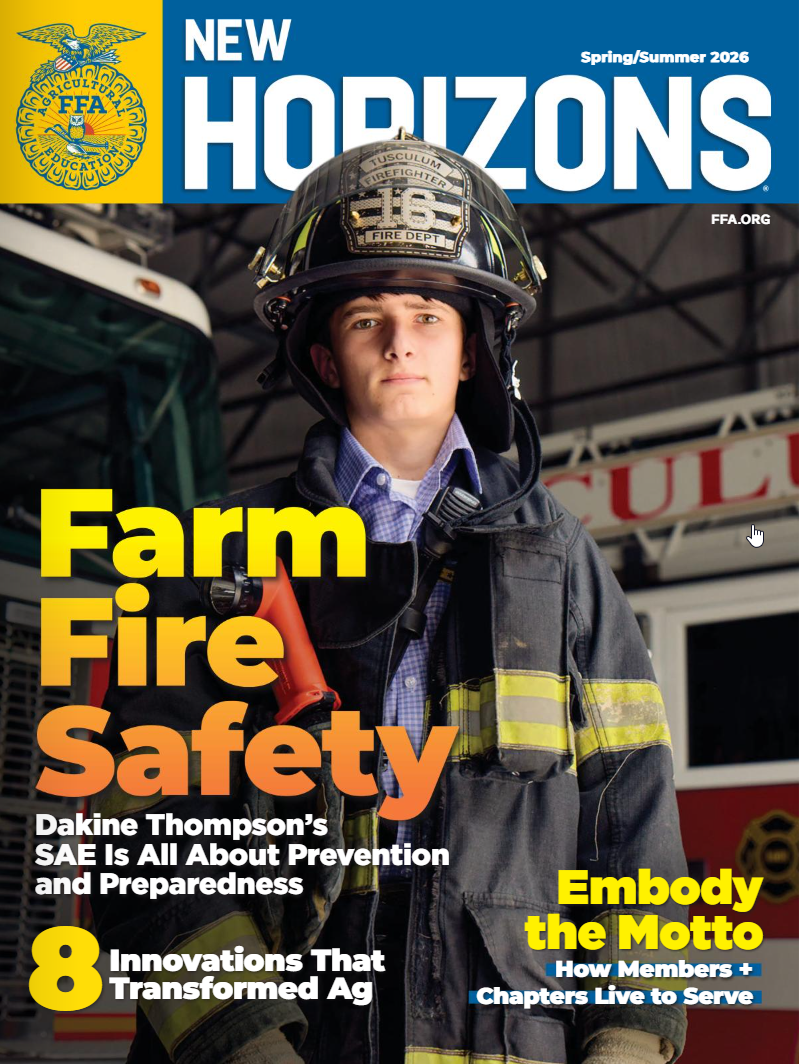A Legacy Rooted in Purpose: Honoring Charles Parker’s 45 Years of Service to California FFA

FFA in the USA Reporter Viviana Velazquez with Charles Parker, who is retiring as California’s state FFA advisor.
After more than four decades of unwavering dedication, Charles Parker, California’s state FFA advisor, is retiring. This marks the closure of a chapter filled with an impactful career that contributed to thousands of students, educators and agriculture communities across the state. His journey, which was filled with van rides, laughter, leadership and love for the profession, is a testament to what it means to live a service-focused life.
Hooked From the First Semester
Parker’s story began with an eighth-grade decision that would shape his life. “A friend convinced me to take an agriculture class,” he says. “He dropped it, but I was hooked that first semester.”
It wasn’t just the curriculum that drew him in; it was the influence of his first agriculture teacher, Gary Cheatwood. “He became a father figure,” Parker says. “He was critical when I needed it and encouraging when I deserved it. He helped me come out of my shell.”
Growing up on a cotton farm, Parker had little experience with livestock until high school, but that didn’t stop him from diving in headfirst. From that moment forward, he knew he wanted to be an agriculture teacher — and he never looked back.
From the Classroom and Beyond
Parker spent 13 impactful years teaching at Kingsburg High School before a summer conference volunteer opportunity opened new doors. “I raised my hand to drive the regional officers to an event, and that one ride changed everything,” he says. Throughout the next several years, he built relationships with regional supervisors and state staff, learning by listening and observing.
Eventually, Parker was hired by the California Department of Education, where he served in numerous roles. He spent 17 years as assistant state FFA advisor, seven years as San Joaquin Region supervisor and served the North Coast Region as an advisor for a brief time. Finally, the role of state FFA advisor and program manager for agricultural education was given to him — a position he held for the last six years until making his decision to retire.
Moments That Matter
When asked about the most meaningful memories, Parker didn’t hesitate. “The van rides,” he says. “Always the van rides. The trust and conversations with students … it was special.”
Another highlight was working with state officers and coordinating the state conference in Fresno as an assistant state advisor. “That was the best job I ever had,” he says. “I got to work with six of the best students in the state.” He misses being around students, as he is heavily focused on the officer team, but is content with seeing students on certain field days and at state conference.
He also cherishes time spent with his fellow educators. One of his favorite stories is a staff meeting that ended in a pie feast. “We couldn’t agree on what kind of pie to order, so each of us got our own whole pie,” he says. “We sat around, ate pie and just talked and laughed and had a great time. Those are the memories with friends that will always be there.” When asked what his favorite pie flavor was, he said, “Pecan.”
Navigating Change, Embracing Growth
Throughout his career, Parker has witnessed dramatic shifts in agricultural education. “When I started, 90% of agriculture teachers were men. Now, 67% are women,” he says. “That’s a huge shift and a good one.”
He also spoke about the increasing academic rigor in agriculture classrooms, particularly with the addition of college-level credits and the need to modernize the curriculum to reflect today’s agricultural technology. “We’re seeing autonomous tractors, drones and electric engines,” he says. “The industry is changing fast, and we need to catch up.”
However, Parker is also mindful of the immense pressures agriculture teachers face as they balance classroom instruction, FFA, community service and personal lives. “It’s hard,” he says. “They’re gone every weekend, every night. We need to support them so they can sustain this work.”
Words of Wisdom
Parker’s advice for young educators is clear: “Pick what matters to you, and build from there,” he says. “Don’t feel like you have to do everything.” He also encourages collaboration with community members and alumni. “Let people help you,” he adds. “That’s how you build a program and stay in the profession for the long haul.”
For students considering agricultural education, he says, “You won’t be rich, not financially. But if you measure wealth by impact and relationships, you’ll be one of the wealthiest people around.” The only advice he had for himself was to “slow down and enjoy.”
Looking Ahead and Letting Go
As he enters retirement, Parker is looking forward to traveling with his wife, visiting her ancestral homeland in the Azores Islands, reconnecting with an exchange student in Germany and driving coast-to-coast across Canada. “For some reason,” he says, “I just want to do it.”
Although he does not plan to publish, he’s found a new creative outlet of writing novels. “I’ve written a murder mystery, just for fun,” he says. “I’m working on a second, and the third will be inspired by notes left behind by our late son. It’ll be a book we co-write, in a way.”
Still, Parker will remain connected to FFA as the keeper of its historical documents, ensuring the legacy of the organization — and his own — lives on.
A Confident Goodbye
Parker says he may feel emotional as his final state conference approaches. But one thing gives him peace: the future is in good hands.
“When we hired Jill Sperling as the new state advisor, I knew it was the right time,” he says. “She’s better prepared than I ever was, and she’s going to take this program to new heights.”
For Parker, the end of his career isn’t about closure; it’s about continuity. “A good leader wants the program to thrive after they leave, and I know it will,” he says.


